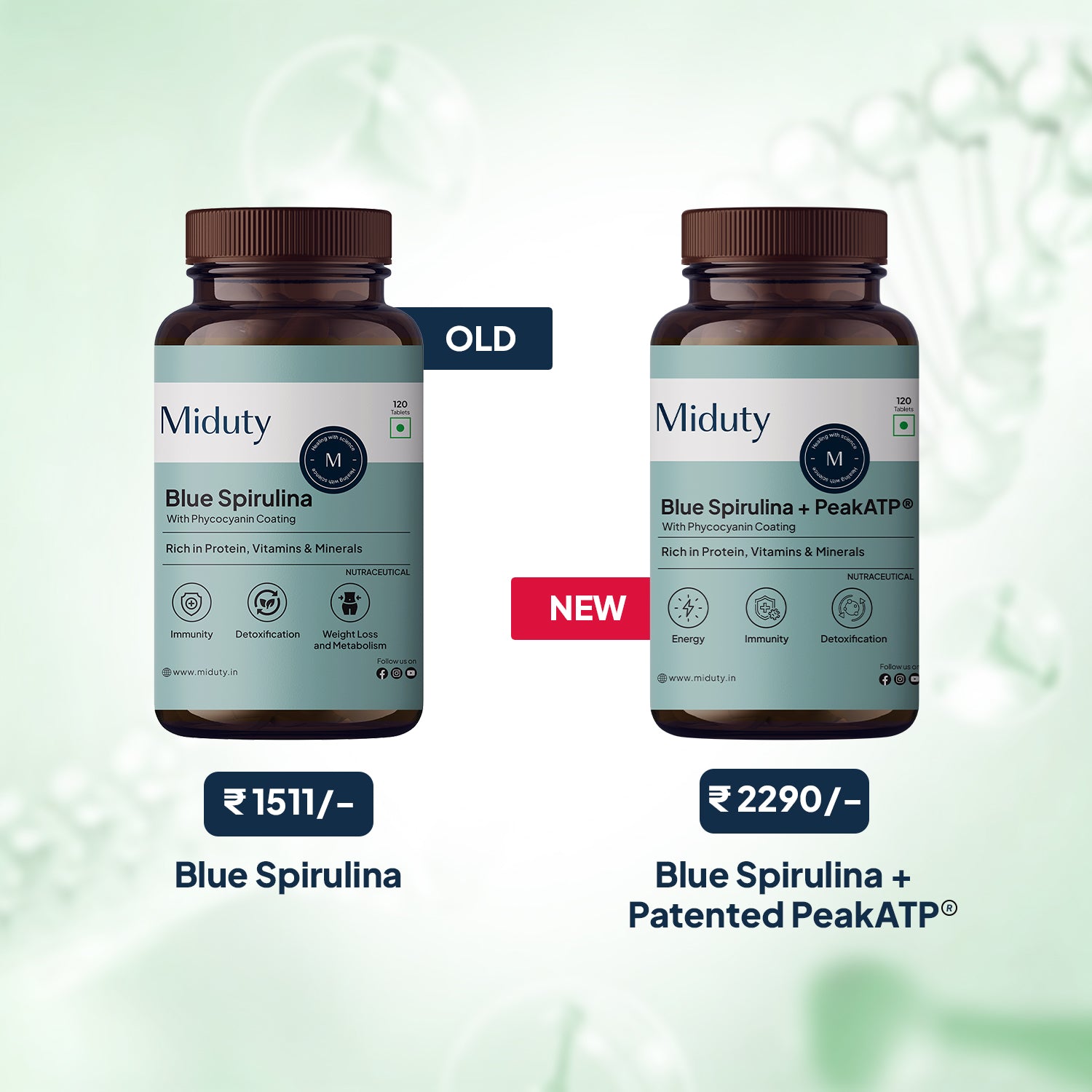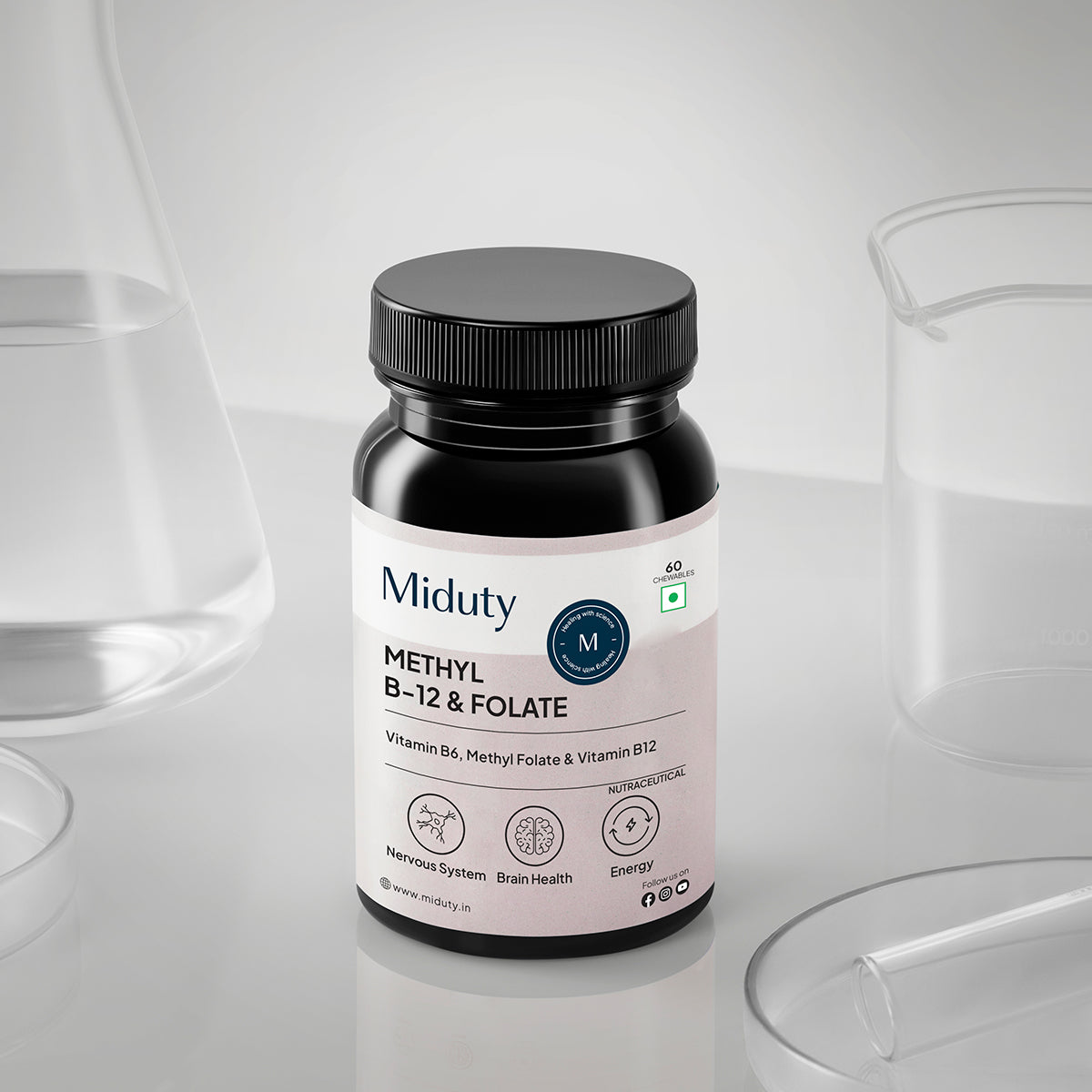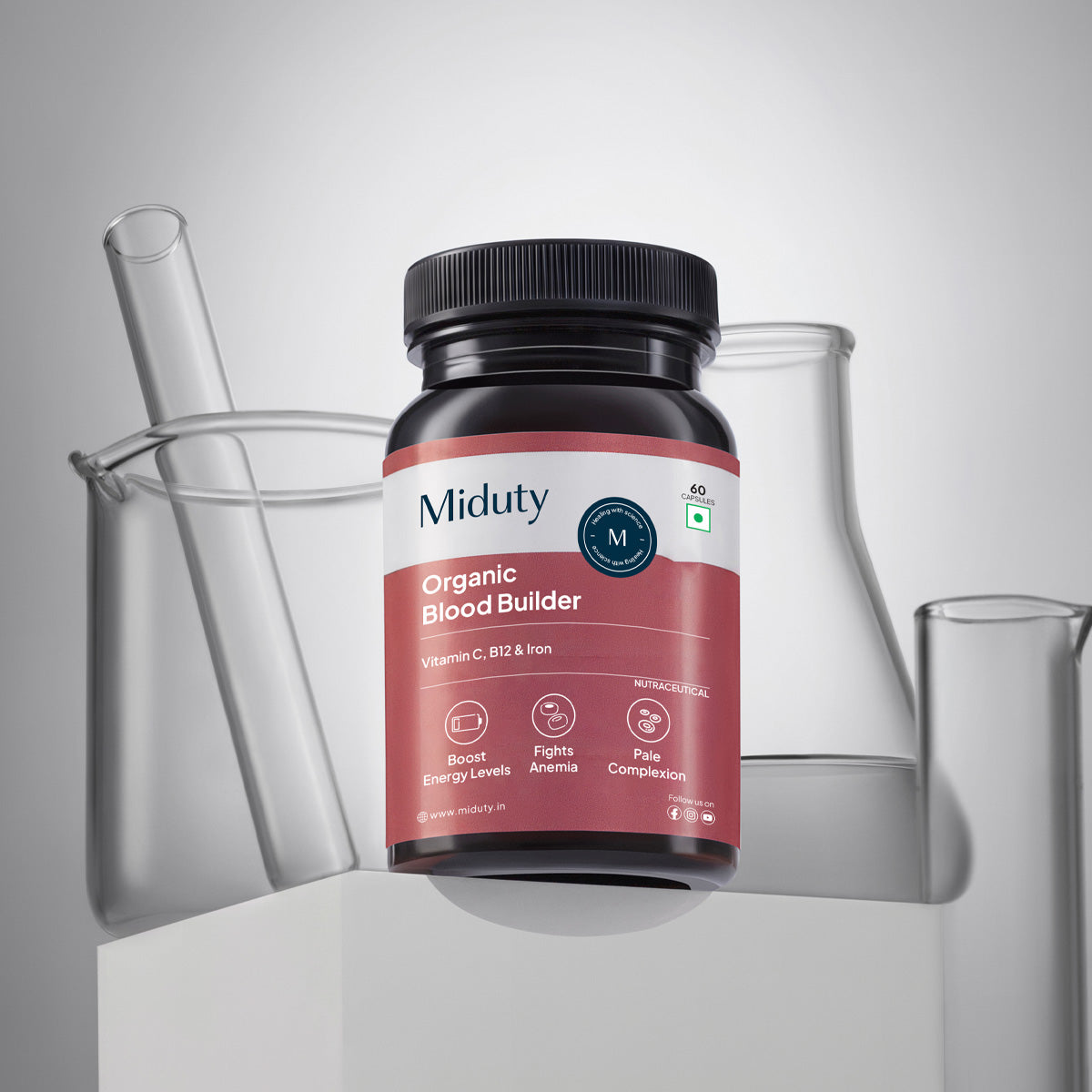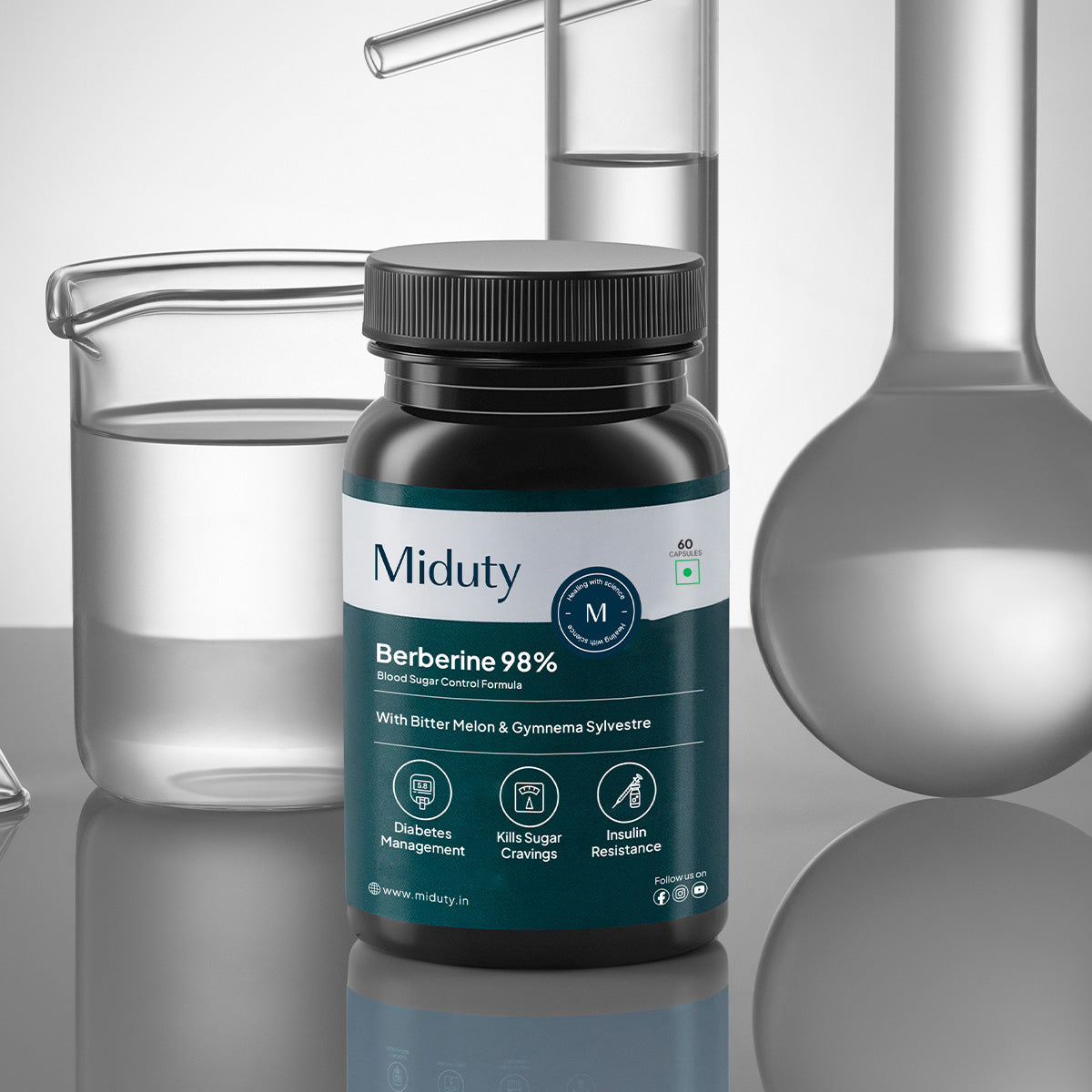
Spirulina Plant 101: Why Spirulina Algae is a Must-Have in Your Diet?
Key Takeaways
1) World's Oldest Life Form: Spirulina is one of the oldest life forms on Earth, dating back around 3.5 billion years, making it a true survivor of the planet's history.
2) Absorbs Heavy Metals: Spirulina can bind to heavy metals, toxins, and pesticides in the body, helping to detoxify and eliminate these harmful substances.
3) A Great Source of Chlorophyll: Spirulina contains a unique form of chlorophyll, which not only helps with detoxification but may also promote wound healing and reduce body odor.
4) Absorbs Heavy Metals: Spirulina can bind to heavy metals, toxins, and pesticides in the body, helping to detoxify and eliminate these harmful substances.
5) Space Travel-Friendly: NASA has researched spirulina as a sustainable food source for long-duration space missions. Its high nutritional density, compact size, and ability to be grown in controlled environments make it ideal for space travelers who need efficient and nutrient-packed sustenance.
Imagine a food so extraordinary that NASA includes it in astronauts' diets for space missions, and the WHO hails it as a "superfood for the future." Spirulina, a blue-green algae, may not look like much, but its benefits are nothing short of revolutionary. This tiny organism is packed with nutrients that can transform the way you think about food and health.
Think about those moments when you're running low on energy, your meals feel repetitive, or you're searching for natural ways to supercharge your nutrition.
Spirulina is the answer—a nutrient powerhouse trusted by ancient civilizations for its sustenance and by modern science for its exceptional health benefits. It's even been considered for long-term space travel due to its ability to provide essential nutrients in a compact form.
From fueling ancient Aztecs to supporting astronauts in space, spirulina isn't just a superfood—it's a testament to how the smallest things can make the biggest impact on health and wellness. Ready to dive into the world of spirulina and see why it deserves a place in your diet? Let's get started!
What is Spirulina?
Spirulina is a nutrient-dense type of blue-green algae that thrives in both freshwater and saltwater environments. Spirulina has a history that dates back centuries, with its use tracing to the Aztecs, who harvested it as a key food source, appreciating its energy-boosting and healing properties. Known as "tecuitlatl" in their culture, spirulina played a vital role in sustaining their active lifestyles.
Fast forward to today, spirulina has become a staple in the world of superfoods. Often referred to as one of the most complete foods on Earth, it's now widely available as a dietary supplement in various forms, including powders, capsules, and tablets. Its popularity stems from its incredibly rich composition—spirulina contains a unique combination of protein, vitamins, minerals, antioxidants, and essential fatty acids.
Spirulina is often called nature's detoxifier because of its ability to bind to heavy metals and flush toxins from the body. Packed with chlorophyll and antioxidants, it supports the liver and boosts the body's natural cleansing process.
A small dose of spirulina provides a concentrated source of nutrients, making it a favorite among health enthusiasts, athletes, and even scientists planning for space travel. Its ability to deliver essential nutrients in a compact form has earned it a permanent spot in the conversation about sustainable and functional foods.
Why Does Spirulina Protein Stand Out?

When it comes to protein content, spirulina is a true champion. Nearly 60–70% of its dry weight is pure protein, making it an excellent plant-based source. Even better, it's a complete protein, containing all nine essential amino acids that our bodies cannot produce on their own. Plus, it's naturally free from heavy metals, ensuring a clean and pure source of nutrition.
1. High Digestibility: Spirulina's protein is easy to digest, thanks to its simple cell structure and lack of tough cell walls. [1]
2. Ideal for Vegetarians and Vegans: For those avoiding animal products, spirulina offers a sustainable and cruelty-free alternative to meet protein needs.
3. Muscle Growth and Repair: Spirulina's complete amino acid profile, including essential ones like leucine and isoleucine, supports muscle protein synthesis and recovery. This makes it an excellent choice for athletes and fitness enthusiasts aiming to build strength and repair tissues after intense workouts.
4. Rich in Branched-Chain Amino Acids (BCAAs): Spirulina contains leucine, isoleucine, and valine, which are essential for muscle recovery and reducing exercise-induced fatigue. [2]
5. Weight Management Support: The high protein content in spirulina helps promote a feeling of fullness, reducing hunger cravings and unnecessary snacking, which can support healthy weight management and help control calorie intake.
6. Boosts Metabolism: Spirulina is a rich combination of amino acids, B vitamins, and essential nutrients that help optimize metabolic function by enhancing energy production and nutrient absorption. This supports the body's ability to burn fat more efficiently and maintain balanced energy levels throughout the day. Regular consumption of spirulina can keep your metabolism running smoothly, promoting overall vitality and stamina. [3]
7. Sustainability Factor: Spirulina's protein production is far more environmentally friendly than traditional animal-based sources, requiring less water and land.
Whether you're blending it into a smoothie or taking it in supplement form, spirulina is a powerhouse of plant-based protein.
Spirulina Nutritional Value: A Superfood Like No Other
Spirulina isn't just about protein; its nutritional profile is a powerhouse of health-enhancing compounds. Packed with vitamins, minerals, antioxidants, and essential nutrients, this tiny algae is a small food with massive benefits.
Key Nutrients in Spirulina
- Vitamins: Spirulina shines as a rich source of B vitamins (B1, B2, B3, and B6), essential for energy production and nervous system health. It also contains vitamins C, D, and E, which support immunity, skin health, and overall vitality. [4]
- Minerals: Loaded with iron for energy levels, manganese for enzymatic reactions, potassium for fluid balance, and calcium for strong bones, spirulina is a mineral-rich treasure. Other key minerals include magnesium and zinc, crucial for metabolic and immune functions. [5]
- ATP Production: The B vitamins found in spirulina are crucial for the synthesis of ATP, the primary energy carrier in cells. By supporting this process, spirulina helps fuel your body's energy needs, boosting physical and mental performance throughout the day. [6]
- DNA and RNA Synthesis: Spirulina is rich in essential nutrients like B vitamins, antioxidants, and minerals that support the production and repair of DNA and RNA. This process is vital for cellular growth, regeneration, and the overall maintenance of healthy tissues. By aiding in the repair of genetic material, spirulina helps promote optimal cell function and longevity.
- Essential Fatty Acids: Spirulina contains omega-6 fatty acids, including gamma-linolenic acid (GLA), which help reduce inflammation, support heart health, and promote hormonal balance. These beneficial fats play a key role in maintaining overall well-being and reducing the risk of chronic conditions.
- Antioxidants: Spirulina's unique pigment, phycocyanin, serves as a powerful antioxidant that helps neutralize harmful free radicals in the body. By reducing oxidative stress and fighting chronic inflammation, it supports overall cellular health and protects against premature aging and disease. [7]
This nutrient-dense profile makes spirulina a superfood unlike any other, capable of supporting energy, health, and longevity with every serving. Here is a table summarizing the nutrient profile of Spirulina:
|
Nutrient |
Quantity (per 7g serving) |
Key Benefits |
|
Protein |
~4g |
Builds & repairs tissues and supports muscle growth. |
|
Vitamin B1 (Thiamine) |
~11% of RDA |
Boosts energy production and nervous system health. |
|
Vitamin B2 (Riboflavin) |
~15% of RDA |
Supports energy metabolism and red blood cell production. |
|
Vitamin B3 (Niacin) |
~4% of RDA |
Improves skin health and supports DNA repair. |
|
Vitamin E |
Present |
Acts as an antioxidant and supports immunity and skin. |
|
Iron |
~11% of RDA |
Improves oxygen transport and reduces fatigue. |
|
Calcium |
~8mg |
Strengthens bones and teeth. |
|
Potassium |
~14mg |
Maintains electrolyte balance and heart health. |
|
Manganese |
Trace Amounts |
Supports enzymatic reactions and bone health. |
|
Phycocyanin |
Present |
Acts as a powerful antioxidant, in combat. |
|
Gamma - Linolenic Acid (GLA) |
Present |
Reduces inflammation and supports hormonal health. |
|
Chlorophyll |
Present |
Detoxifies the body and improves immunity. |
How Spirulina Leaves Benefit Your Health?
While spirulina is often consumed as a powder or supplement, many people wonder about its "leaves." The term "spirulina leaves" is a bit of a misnomer since spirulina is algae and doesn't have leaves like terrestrial plants. Instead, its spiral-shaped cells form clusters that resemble tiny leaves under a microscope.
How Spirulina Leaves Are Harvested?
Spirulina is cultivated in controlled ponds or tanks, where it thrives in alkaline water. After harvesting, the algae are dried and processed into powder, capsules, or tablets, preserving their rich nutritional content.
Why is Spirulina Algae Better Than Conventional Greens?
Spirulina algae stands out for its impressive nutrient density, offering higher concentrations of vitamins, minerals, and protein compared to most leafy greens. Not only is it packed with essential nutrients, but its cultivation is also more sustainable, requiring less water and land than traditional crops, making it an eco-friendly choice.
Additionally, spirulina's versatility as a powder allows it to be easily incorporated into a variety of recipes, giving you flexible options to boost your nutrition effortlessly.
How to Choose the Best Spirulina Supplement?
Choosing the best spirulina supplement requires careful consideration of its quality and composition. While blue spirulina stands out for its vibrant color and potent antioxidant benefits, the ideal supplement should have a high concentration of phycocyanin, the powerful pigment responsible for many of spirulina's health benefits.
Look for a supplement that has a high concentration of phycocyanin, is free from heavy metals, is non-GMO, and is carefully stored in UV-protected packaging to preserve its nutrient integrity. Prioritizing these features ensures you get the cleanest and most effective spirulina available.
Conclusion
From ancient Aztec warriors to modern-day astronauts, spirulina has proven itself as a nutrient-dense powerhouse. With its unparalleled protein content, a treasure trove of vitamins and minerals, and ability to support ATP production and DNA synthesis, this blue-green algae truly lives up to its superfood status. Whether you're looking to boost energy, improve overall health, or make your diet more sustainable, spirulina offers an easy and effective solution.
Its versatility, nutritional density, and eco-friendly cultivation make it a must-have in any modern diet. So, whether you choose to sprinkle it into your meals or take it as a supplement, spirulina is your one-stop ticket to better health, naturally.
Frequently Asked Questions on Spirulina Plant -
Q1 - Is Spirulina a fruit or vegetable?
Spirulina is neither a fruit or a vegetable; it is a type of nutrient-dense blue-green algae.
Q2 - Is Spirulina antifungal?
Yes, spirulina exhibits antifungal properties due to its bioactive compounds, which can inhibit the growth of certain fungal strains.
Q3 - Did NASA use Spirulina?
Yes, NASA has used spirulina as a dietary supplement for astronauts during space missions due to its high nutrient density and compact form.
Q4 - Is Spirulina high in uric acid?
No, spirulina is not high in uric acid. In fact, it's low in purines, making it a suitable option for those concerned about uric acid levels.
Q5 - Can I just drink spirulina with water?
Yes, you can mix spirulina powder with water and drink it. However, due to its strong taste, many prefer blending it into smoothies or juices for better flavor.
References












